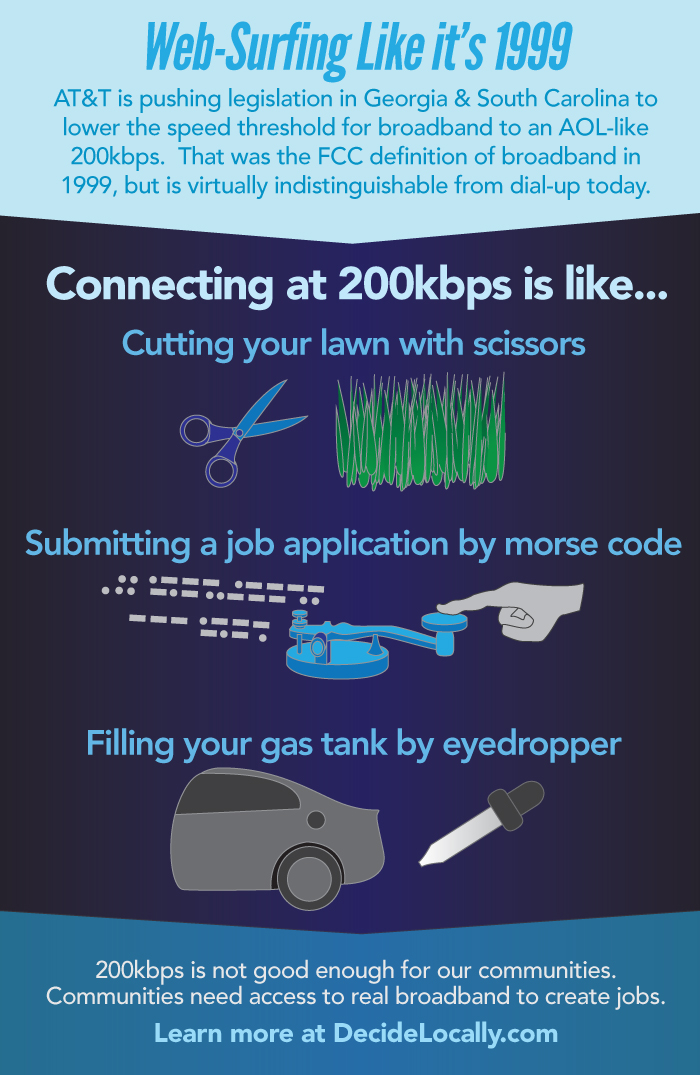Image


A municipal government cannot possibly hope to compete with well-capitalized broadband providers in a highly competitive market.For those unfamiliar with Heartland, they don't use the same definitions for common words like "competitive" as the rest of us do. In Heartland's world, "competitive" means a market in which one of our funders operates regardless of how much competition exists in it. So why do we need new legislation to make it even harder for communities to build the networks that the cable and DSL companies won't build?
 Feel free to spread it around. Higher quality pdf below.
Feel free to spread it around. Higher quality pdf below.The SCCTA has been actively following the AT&T-backed legislation that would amend the Government-Owned Telecommunications Service Providers Act. House Bill 3508 would impose the same requirements on government-owned broadband operations that are currently imposed on telecommunications operations.Of course, H.3508 goes far beyond applying the "same requirements." It enacts a host of requirements that only apply to public providers, which are already disadvantaged by being much smaller than companies like Time Warner Cable and AT&T. We have long ago debunked the myth of public sector advantages over the private sector. The second quarter newsletter [pdf] identifies this bill as the highest priority of the cable association:
H3508, the AT&T backed legislation, has been our dominate piece of legislation in 2011.
Erik Poulsen, government relations director at Washington Public Utility District Association, said PUDs have used the wholesale authority they were granted in 2000, building 4,500 miles of fiber-optic cable, investing $300 million in infrastructure and joining with 150 retail providers.
The other is rural access lines; we have been apprehensive on moving, doing anything on rural access lines because the issue here is, do you have a broadband product for rural America? We’ve all been trying to find a broadband solution that was economically viable to get out to rural America, and we’re not finding one to be quite candid. The best opportunity we have is LTE.Whoa! LTE is what you more commonly hear called 4G in mobile phone commercials. The best they can do is eventually build a wireless network that allows a user to transfer just 2GB/month. That is fine for hand-held devices but it does nothing to encourage economic development or allow residents to take advantage of remote education opportunities. But even the CEO admits they are not bullish on LTE as the solution:
[W]e’re looking at rural America and asking, what’s the broadband solution? We don’t have one right now.Some may be wondering about "U-Verse" -- AT&T's super DSL that competes with cable in the wealthy neighborhoods of bigger cities. U-Verse cannot match the capacity or quality of modern cable networks but is better than older DSL technologies. But U-Verse is not coming to a rural community near you. For those who missed the fanfare last year, AT&T's U-Verse build is done. AT&T's lobbyists have probably forgotten to tell Georgia and South Carolina Legislators that the over 20 million AT&T customers without access to U-Verse are not going to get it.
Rogers’ legislation is exceptionally friendly to the state’s incumbent phone and cable companies, and they have returned the favor with a sudden interest in financing Rogers’ 2012 re-election bid. In the last quarter alone, Georgia’s largest cable and phone companies have sent some big thank-you checks to the senator’s campaign:Phil also refutes the supposed failures cited by those pushing the bill. Not only do such stories misrepresent what really happened, some actually cite EPB's incredible 1Gbps service as demonstrating that munis are out of touch. What else would you expect from the Heartland Institute, which made its name fighting against the radical claim that cigarettes are linked to cancer? Government Technology's Brian Heaton also covered the story in "Georgia Community Broaband in Legislative Crosshairs."A review of the senator’s earlier campaign contributions showed no interest among large telecommunications companies operating in Georgia. That all changed, however, when the senator announced he was getting into the community broadband over-regulation business.
- Cable Television Association of Georgia ($500)
- Verizon ($500)
- Charter Communications ($500)
- Comcast ($1,000)
- AT&T ($1,500)
In addition, Mitchell [me] said that SB 313’s requirement of the public entity paying the same taxes or the same cost of capital as the private sector is another red herring.
"The private sector is handling this exceptionally well," Rogers said. "What they don't need is for a governmental entity to come in and compete with them where these types of services already exist.